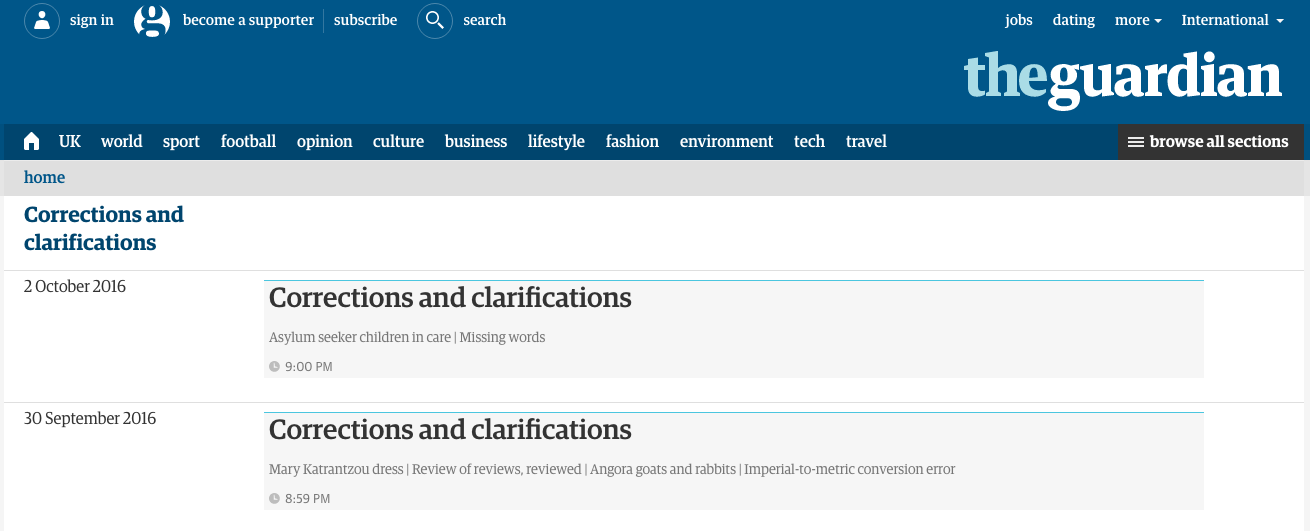By Kirk LaPointe
If the academic literature suggests one-half of all stories contain a factual error, then it is clear that corrections should be in routine order.
But when and how to do so is a debate within journalism, particularly in this iterative age of digital reporting when our craft updates and doesn’t always acknowledge what information has changed along the way.
There is no easy answer, but that shouldn’t mean taking the easy way out. A mistake or an error harms someone, something, somewhere, and the technological solution to simply overwrite is the modern equivalent of sweeping something under the rug—the dirt is still there, just obscured.
Our problem in journalism is our defensive culture. We can expect of others what we do not ourselves supply: admission, contrition, and declaration to do better.
And when we do concede something was amiss, we can do so in the least uncomfortable way, almost as a miserly act of defiance. In doing that we are little better than the institutions and figures we claim need to be held accountable.
Like any journalist, I’ve made my share of mistakes in stories—someone once told me that we all do, which is why there are erasers on pencils. I’ve felt badly when erring and at times acted badly in correcting the record. It took time, but I’ve come to the conclusion that any cloak on a mistake does nothing to advance the public record or the career of the non-conceding journalist. I am now a fan of making a virtue of the correction process.
Take, for instance, The Guardian’s daily Corrections and Clarifications feature. Spelling mistakes, misstated street names, distance and measurement problems, and larger issues of conceptual misunderstanding are summarized. There is no small amusement in what’s in the feature and some of the amusingly small things The Guardian wants made clearer.
But in providing this feature for decades now, The Guardian has taken some of the sting from the correction, humanized its newsroom, and accepted that its readership is bright enough to recognize that the best among us admit mistakes.
In the process it has built a better covenant with its audience. At the very least it’s a more authentic pact than one that pretends infallibility in its journalism and dismisses the complaint about the obvious blunder.
The Internet has been a blessing and curse on the journalistic mistake. The pressure to be speedy unquestionably prompts more errors, and the technology permits identification and remedy of the problems sooner.
Still, for reasons that escape me, few newsrooms fall fully on the sword. They seem to prefer public shaming on social media about the half-concession than the congratulations that might ensue for coming clean. They fear that an admitted mistake is a weakness—a competitive susceptibility—rather than a demonstration of leadership in clear reporting.
A mistake might not seem significant to us, but to someone it is. And we are fooling no one—only annoying people, in fact—with a culture of denial.
If I had some prescriptions, it would be for errors on published stories to be cited at the top, not bottom, of subsequent versions and be quite clearly stated. As in: a) We said this earlier in error, b) this is why we think it happened, and c) this is the correct information—at least, as far as we know. (And broadcasters, I’m also talking to you.)
The correction deserves the prominence of the error because, let’s face it, the correction will never outweigh the error.
There is an old axiom: Journalism is less about publishing the truth than in pursuing it and publishing what we believe in our hearts to be true at deadline. If we were more candid with our audience about our challenges in gathering and providing information, we wouldn’t lose trust but restore it.
Kirk LaPointe is the former CBC Ombudsman and the past Executive Director of the Organization of News Ombudsmen. He teaches ethics and leadership at the Graduate School of Journalism at University of British Columbia, is the Vice President, Audience and Business Development, at Business in Vancouver Media Group, and the evening host on Roundhouse Radio 98.3 FM Vancouver.
Kirk LaPointe is the former CBC Ombudsman and the past Executive Director of the Organization of News Ombudsmen. He teaches ethics and leadership at the Graduate School of Journalism at University of British Columbia, is the Vice President, Audience and Business Development, at Business in Vancouver Media Group, and the evening host on Roundhouse Radio 98.3 FM Vancouver.

